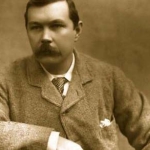The poet’s duties: no need to stress
The subject’s dullness, nonetheless
Here’s an incestuous address
In Robert Burns’ style
To one whom all the Muses bless
At Great Turnstile.
I’ve no excuses for this theme.
Prescription is less popular than dream
And little rhymes, god knows, can seem
Much too laconic,
Bollinger’s visionary gleam
Turned gin-and-tonic.
But ssch! you know and understand
The way these verses have been planned:
Gritty like little bits of sand
Not shining quartz;
No pulsing from a higher gland
Just random thoughts.
Let’s start by thinking of objectives.
Poets hate to have directives:
They’re on their own, not on collectives,
Share and share about,
And what inspires their best invectives
Is what they care about.
You, James, collapsed upon our sofa
As though being driven by a chauffeur,
Won’t fail to tell us what you go for:
Managerial boobs
And answers that you won’t take no for
From Fine Tubes.
Reporters never throw in towels.
Their prose is written from the bowels.
Ottava rima about owls
Printed by Sycamore
Is worlds away from Enoch Powell’s
Plans for the blackamoor.
But are you James Cameron or Flecker?
Are you a maker or a trekker?
What is the nature of your Mecca,
Your verum pulchrum?
I’m glad, of course, that you’re with Secker
And not with Fulcrum.
Poet and traveller have quarrelled
And now you canter where you carolled.
We’re waiting still for your Childe Harold,
Though quests in Poland
Find you fixated and apparelled
More like Childe Roland.
It is impressive, I agree,
Although I know it’s not for me.
I take the windfalls from the tree,
I’m much too lazy,
The prisons that I want to see
By Piranesi.
You say that Oxford has no marrow,
Sucked dry by Trevor-Roper, Sparrow,
And others of reaction’s farrow
In their fat cloister,
Though if my eye is just as narrow
It may be moister.
We never see our feelings through,
And weeping only makes us blue.
It may be beautiful and true
But it’s not action,
And nothing the bourgeoisie can do
Gives satisfaction.
How can we alter our behaviour?
Should we deny our gravy’s gravier?
Leave Cleopatra for Octavia?
My life is inner,
And someone I don’t think a saviour
Is B. F. Skinner.
Avoid that fashionable flock:
To be refitted in their dock
Your common-sense must take a knock
As it took a course on
The reflexes of frogs, and Locke,
And P. F. Strawson.
Much of the Left we can ignore
(Sheer anarchy I don’t adore).
The trendy educate the poor
While Labour’s entered on the war
Of Jenkins’ ear.
No. Righteous more than He who Hath,
More reasonable than New Math,
Momier than the Mome Rath
In their outgrabing,
Glossing the Variorum Plath
From Krafft-Ebing,
Apostles of determinism
Whose hero’s Mao or Virgil Grissom
Won’t interest your mind one rissom:
You’re too empirical.
What about Neo-Imagism?
Impossibly lyrical.
Such knowing brevity needs patience:
As unfastidious Croatians
Upon quite intimate occasions
Shun body-talc,
So leave your interpersonal relations
To Colin Falck.
For poetry to have some merit he
Requires it to display sincerity,
Each pronoun to convince posterity
With deep emotion
And an invigorating verity
Like hair-lotion.
Well, that’s unfair. I’m glad he lives.
Just think of the alternatives!
Those whose verse resembles sieves
Or a diagram,
And foul-mouthed transatlantic spivs
Wooing Trigram.
For they are all still with us, James,
Fiddling among the flames,
Brandishing the brittle fames
They soon arrive at.
It’s better not to mention names:
They’ll wince in private.
Orating offspring of Urania
(No fault of yours that they’re not brainier)
Have an immodest dogged mania
For autobiography
Disguised in concrete or the zanier
Forms of typography.
The wide-eyed audience they’re rooking
Would secretly prefer a booking
From a quartet like the backward-looking
Rank Ailanthus
They’d jump to hear what’s really cooking
With the Black Panthers.
Whatever props the poet uses,
Whether he accepts, accuses
Or gives up, he must know his Muse is
A sensible girl.
Even some antics of Ted Hughes’s
Make her hair curl.
And so you need a form to play
About in but which will convey
Something of what you want to say
Without evasion,
Adjusting like the Vicar of Bray
To each occasion.
The size you haven’t found as yet.
What Nabokov calls the ‘triolet’
Is much too trim a maisonette
To dawdle in,
Unlike your shabby Cloisters set
In Magdalen,
Which made your poetry much dandier,
Much like ottava rima, handier.
You needed in its chilly grandeur
To turn the fire on
For times when you felt even randier
Than Lord Byron.
Still, you found sonnets quite inspiring
Although some rhymes like ancient wiring
Showed the circuits could prove tiring
(Though not unduly,
And no one could be more admiring
Than Yours Truly).
So carry on: your talents hum.
No one will ever find you dumb
While you avoid the slightly rum
Like the White Goddess
Or Black Mountain (and don’t become
Roger Woddis).
I’ll send a sub to the IS
(Please let me know the right address)
I shan’t turn up, but I confess
I’m not a traitor.
I just don’t want to think the less
Of Teresa Hayter.
Some day I’ll join you in the street
Where suffering and truth must meet:
It isn’t easy not to feel effete
This side of anguish,
When those who can’t choose what to eat
Don’t speak our language.
Meanwhile we have to try to bring
Some order to that circus ring
Where people think and feel and sing,
For at its centre
There’s no escape from anything,
And we must enter.


















Comment form: